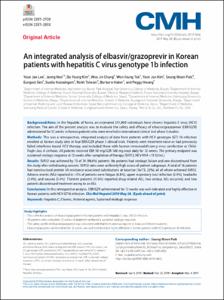KUMEL Repository
1. Journal Papers (연구논문)
1. School of Medicine (의과대학)
Dept. of Internal Medicine (내과학)
An integrated analysis of elbasvir/grazoprevir in Korean patients with hepatitis C virus genotype 1b infection
- Keimyung Author(s)
- Chung, Woo Jin
- Department
- Dept. of Internal Medicine (내과학)
- Journal Title
- Clinical and Molecular Hepatology
- Issued Date
- 2019
- Abstract
- Background/Aims:
In the Republic of Korea, an estimated 231,000 individuals have chronic hepatitis C virus (HCV) infection. The aim of the present analysis was to evaluate the safety and efficacy of elbasvir/grazoprevir (EBR/GZR) administered for 12 weeks in Korean patients who were enrolled in international clinical trial phase 3 studies.
Methods:
This was a retrospective, integrated analysis of data from patients with HCV genotype (GT) 1b infection enrolled at Korean study sites in four EBR/GZR phase 3 clinical trials. Patients were treatment-naive or had previously failed interferon-based HCV therapy, and included those with human immunodeficiency virus coinfection or Child- Pugh class A cirrhosis. All patients received EBR 50 mg/GZR 100 mg once daily for 12 weeks. The primary endpoint was sustained virologic response at 12 weeks after completion of therapy (SVR12, HCV RNA <15 IU/mL).
Results:
SVR12 was achieved by 73 of 74 (98.6%) patients. No patients had virologic failure and one discontinued from the study after withdrawing consent. SVR12 rates were uniformly high across all patient subgroups. A total of 16 patients had nonstructural protein 5A resistance-associated substitutions at baseline (16/73, 22%), all of whom achieved SVR12. Adverse events (AEs) reported in >5% of patients were fatigue (6.8%), upper respiratory tract infection (5.4%), headache (5.4%), and nausea (5.4%). Thirteen patients (17.6%) reported drug-related AEs, two serious AEs occurred, and two patients discontinued treatment owing to an AEs.
Conclusions:
In this retrospective analysis, EBR/GZR administered for 12 weeks was well-tolerated and highly effective in Korean patients with HCV GT1b infection.
- Keimyung Author(s)(Kor)
- 정우진
- Publisher
- School of Medicine (의과대학)
- Citation
- Barbara Haber et al. (2019). An integrated analysis of elbasvir/grazoprevir in Korean patients with hepatitis C virus genotype 1b infection. Clinical and Molecular Hepatology. doi: 10.3350/cmh.2019.0006
- Type
- Article
- ISSN
- 2287-285X
- Source
- https://www.e-cmh.org/journal/view.php?doi=10.3350/cmh.2019.0006
- Appears in Collections:
- 1. School of Medicine (의과대학) > Dept. of Internal Medicine (내과학)
- 파일 목록
-
-
Download
 oak-2019-0146.pdf
기타 데이터 / 502.35 kB / Adobe PDF
oak-2019-0146.pdf
기타 데이터 / 502.35 kB / Adobe PDF
-
Items in Repository are protected by copyright, with all rights reserved, unless otherwise indicated.